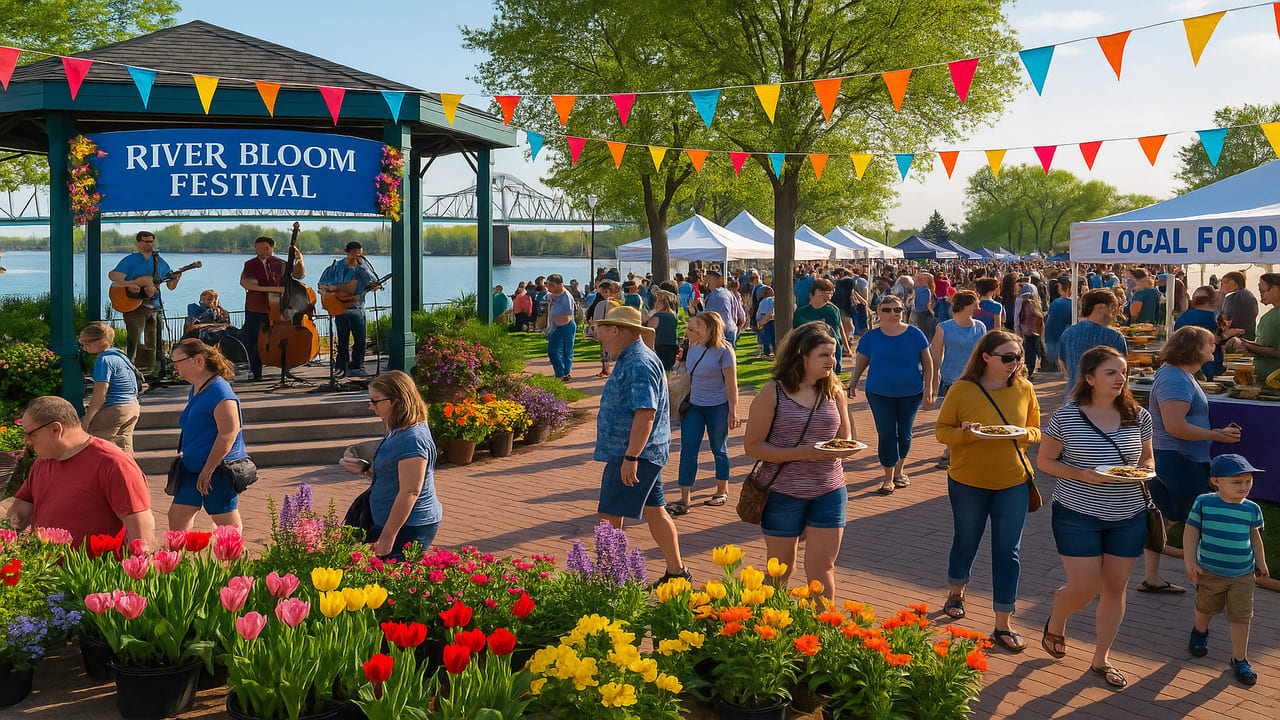
Meet Muscatine – As the final traces of winter melt into the flowing waters of the Mississippi. The city of Muscatine awakens each year to one of its most vibrant traditions the River Bloom Festival. Held every spring along the scenic riverfront, this festival celebrates the spirit of renewal, growth, and community with a colorful blend of live music, local cuisine, and flower markets. What began as a modest gathering has blossomed much like the blooms it showcases into one of the most anticipated seasonal events in eastern Iowa.
Set against the natural backdrop of the Mississippi River and Muscatine’s charming riverwalk. River Bloom Festival captures the essence of what spring means in the Midwest energy, color, warmth, and connection. With every passing year, it becomes not just a celebration of the season, but a reflection of the city’s evolving cultural identity.
One of the festival’s major draws is its live music lineup. Which transforms the riverbank into a stage for both local talent and regional headliners. From acoustic folk to jazz ensembles and upbeat indie bands, the variety mirrors the diversity of the community itself. Strolling through the park, visitors are serenaded by melodies that echo between tents, picnic blankets, and flower displays.
For many Muscatine residents, the music isn’t just background entertainment it’s the heartbeat of the event. Young musicians from local schools often get their first taste of a public stage here. While seasoned performers return year after year, contributing to a musical continuity that ties the festival’s history together.
Also Read : Pearl City Festivals: The Art and Impact of Memorable Names
Of course, no community festival would be complete without great food and River Bloom delivers in full bloom. A curated lineup of local food vendors offers an edible journey through Iowa’s unique culinary landscape. Guests can enjoy everything from slow-smoked BBQ and farm-fresh corn fritters to vegan wraps, artisan pastries, and fresh lemonade served in mason jars.
Special attention is given to farm-to-table and locally sourced ingredients, aligning the festival with broader sustainability efforts and Muscatine’s agricultural roots. There’s also a section of the festival devoted entirely to culinary artisans. Where visitors can sample small-batch jams, infused honey, and handmade chocolates.
What makes this aspect truly special is the personal connection. Many of the vendors are local families and small business owners who have lived in Muscatine for generations. They’re not just selling food they’re sharing heritage.
At the heart of River Bloom is its signature flower and plant market. A sprawling open-air bazaar where dozens of local growers and florists showcase everything from tulips and daffodils to succulents, bonsai, and native wildflowers. The fragrance is intoxicating, the colors overwhelming, and the opportunity to take home a bit of spring is irresistible.
This market has grown in reputation over the years, drawing plant enthusiasts and amateur gardeners from across the region. It’s not uncommon to see people leaving with arms full of hanging baskets, vegetable starters, or handcrafted planters. The market also hosts horticultural workshops, teaching everything from container gardening to eco-friendly pest control, often led by Iowa Master Gardeners.
The floral theme doesn’t stop at the market. The entire festival is decorated with seasonal blooms flower arches, petal-strewn pathways. Living walls that serve as both art and backdrop for selfies and spring family portraits.
Read More : Cedarwind Beach: Where the Breeze Meets the Pines of Mark Twain Lake
While the River Bloom Festival is a burst of color and celebration, its roots run deep in community collaboration. The event is organized with the help of local schools, nonprofits, gardening clubs, and musicians’ unions. Volunteers from across Muscatine come together to staff information booths, help with clean-up, and manage stages.
This grassroots model has helped the festival remain accessible and inclusive. Admission is free, and there are dedicated spaces for children’s activities, accessibility services for the elderly and disabled, and eco-initiatives like composting stations and reusable cup programs.
Looking forward, the organizing committee has plans to expand the festival’s scope adding night markets, art installations, and perhaps even a river lantern ceremony to close the event. As spring continues to mark new beginnings, River Bloom Festival grows with it: not just as a seasonal highlight, but as a symbol of Muscatine’s creativity, resilience, and shared joy.